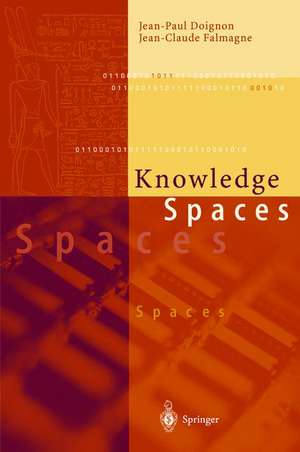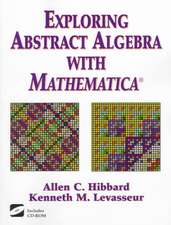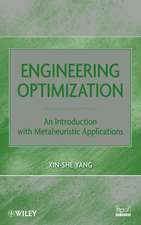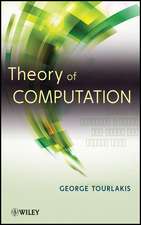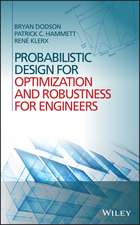Knowledge Spaces
Autor Jean-Paul Doignon, Jean-Claude Falmagneen Limba Engleză Paperback – 20 oct 1998
Preț: 643.34 lei
Preț vechi: 756.86 lei
-15% Nou
Puncte Express: 965
Preț estimativ în valută:
123.10€ • 128.53$ • 101.88£
123.10€ • 128.53$ • 101.88£
Carte tipărită la comandă
Livrare economică 04-18 aprilie
Preluare comenzi: 021 569.72.76
Specificații
ISBN-13: 9783540645016
ISBN-10: 3540645012
Pagini: 352
Ilustrații: XVI, 334 p. 4 illus.
Dimensiuni: 155 x 235 x 18 mm
Greutate: 0.5 kg
Ediția:Softcover reprint of the original 1st ed. 1999
Editura: Springer Berlin, Heidelberg
Colecția Springer
Locul publicării:Berlin, Heidelberg, Germany
ISBN-10: 3540645012
Pagini: 352
Ilustrații: XVI, 334 p. 4 illus.
Dimensiuni: 155 x 235 x 18 mm
Greutate: 0.5 kg
Ediția:Softcover reprint of the original 1st ed. 1999
Editura: Springer Berlin, Heidelberg
Colecția Springer
Locul publicării:Berlin, Heidelberg, Germany
Public țintă
ResearchCuprins
0. Overview and Mathematical Glossary.- Main Concepts.- Possible Limitations.- A Practical Application: The Aleks System.- Potential Applications to Other Fields.- On the Content and Organization of this Book.- Glossary of Mathematical Concepts.- Original Sources and Related Works.- 1. Knowledge Structures and Spaces.- Fundamental Concepts.- Knowledge Spaces.- Closure Spaces.- Substructures.- Bases and Atoms.- An Algorithm for Constructing the Base.- An Algorithm for Generating a Space from its Base.- Bases and Atoms: the Infinite Case*.- The Surmise Relation.- Quasi Ordinal Spaces.- Original Sources and Related Works.- Problems.- 2. Well-Graded Knowledge Structures.- Essentially Finite Structures.- A Well-Graded Family of Relations: the Biorders*.- The Infinite Case*.- Finite Learnability.- Original Sources and Related Works.- Problems.- 3. Surmise Systems.- Basic Concepts.- Knowledge Spaces and Surmise Systems.- AND/OR Graphs.- Surmise Functions and Wellgradedness.- Hasse Systems.- Resolubility and Acyclicity.- Original Sources and Related Works.- Problems.- 4. Skill Maps, Labels and Filters.- Skills.- Skill Maps: The Disjunctive Model.- Minimal Skill Maps.- Skill Maps: The Conjunctive Model.- Skill Multimaps: The Competency Model.- Labels and Filters.- Original Sources and Related Works.- Problems.- 5. Entailments and the Maximal Mesh.- Entailments.- Entail Relations.- Meshability of Knowledge Structures.- The Maximal Mesh.- Original Sources and Related Works.- Problems.- 6. Galois Connections*.- Three Exemplary Correspondences.- Closure Operators and Galois Connections.- Lattices and Galois Connections.- Knowledge Structures and Binary Relations.- Granular Knowledge Structures and Granular Attributions.- Knowledge Structures and Associations.- Original Sources and Related Works.- Problems.- 7. Probabilistic Knowledge Structures.- Basic Concepts and Examples.- An Empirical Application.- The Likelihood Ratio Procedure.- Learning Models.- A Combinatorial Result.- Markov Chain Models.- Probabilistic Substructures.- Nomenclatures and Classifications.- Independent Substructures.- Original Sources and Related Works.- Problems.- 8. Stochastic Learning Paths.- A Knowledge Structure in Euclidean Geometry.- Basic Concepts.- Basic Results.- Assumptions on Distributions.- The Learning Latencies.- Empirical Predictions.- Limitations of this Theory.- Simplifying Assumptions.- Remarks on Application and Use of the Theory.- An Application of the Theory to the Case n =2.- Original Sources and Related Works.- Problems.- 9. Descriptive and Assessment Languages.- Languages and Decision Trees.- Terminology.- Recovering Ordinal Knowledge Structures.- Recovering Knowledge Structures.- Original Sources and Related Works.- Problems.- 10. Uncovering the State of an Individual: A Continuous Markov Procedure.- A Deterministic Algorithm.- Outline of a Markovian Stochastic Process.- Notation and Basic Concepts.- Special Cases.- General Results.- Uncovering the Latent State.- Refining the Assessment.- Proofs*.- Original Sources and Related Works.- Problems.- 11. Uncovering the State of an Individual: A Markov Chain Procedure.- Outline of a Markov Chain Procedure.- The Stochastic Assessment Process.- Combinatorial Assumptions on the Structure.- Markov Chains Terminology.- Results for the Fair Case.- Uncovering a Stochastic State: Examples.- Intractable Case.- Original Sources and Related Works.- Problems.- 12. Building the Knowledge Structure in Practice.- Koppen’s Algorithm for Constructing the Knowledge Space.- Kambouri’s Experiment.- Results.- Discussion of Kambouri’s Results.- Cosyn and Thiéry’s Work.- Refining a Knowledge Structure.- Simulation of Various Refinements.- Original Sources and Related Works.- Problems.- References.- Index of Names.- Index of Terms.
Textul de pe ultima copertă
Knowledge spaces offer a rigorous mathematical foundation for various practical systems of knowledge assessment. An example is offered by the ALEKS system (Assessment and LEarning in Knowledge Spaces), a software for the assessment of mathematical knowledge. From a mathematical standpoint, knowledge spaces generalize partially ordered sets. They are investigated both from a combinatorial and a stochastic viewpoint. The results are applied to real and simulated data. The book gives a systematic presentation of research and extends the results to new situations. It is of interest to mathematically oriented readers in education, computer science and combinatorics at research and graduate levels. The text contains numerous examples and exercises and an extensive bibliography.
Caracteristici
Interdisciplinary representation of the theory of Knowledge Spaces. Application oriented introduction based on real and simulated data.
